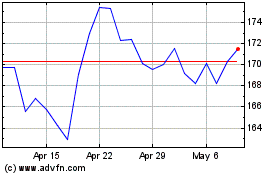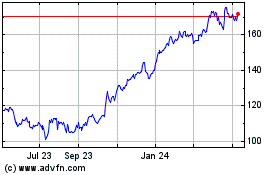US Insurers Push For Changes In Financial Overhaul Bill
March 19 2010 - 2:43PM
Dow Jones News
U.S. Senate efforts to overhaul regulation of U.S. financial
markets may not contemplate major changes for insurers, but
industry groups are hoping to secure a number of changes ahead of
next week's committee consideration of the bill.
"The Washington experience with regulation is bank-centric,
which is understandable, but that doesn't always work for our
industry," said Leigh Ann Pusey, CEO of the American Insurance
Association.
Pusey's group and other representatives of property and casualty
companies are hoping for big and small changes in the legislation
Senate Banking Committee Chairman Christopher Dodd (D., Conn.)
introduced Monday. Their efforts highlight the intense scrutiny
lobbyists and the private firms they represent are giving the
1,300-plus-page bill, as well as the detail-intensive debates
occurring on a daily basis since the proposal was introduced.
One of the biggest priorities for insurance groups is either
carving out their industry or modifying language that could
potentially require some members of their industry to contribute to
a government fund to wind down large failing financial
institutions.
The Senate bill calls for an initial $50 billion fund to
primarily be paid for by the biggest financial institutions, but
members of the insurance industry are concerned that some of their
firms could be required to help contribute if the fund was to be
depleted and had to be refilled. The fact that insurers didn't
contribute to the financial crisis and don't pose the same risks as
other financial firms makes that unfair, said Ben McKay, senior
vice president of federal government relations for the Property
Casualty Insurers Association of America.
"If you're going to make us pay, you shouldn't make us pay for a
more risky firm," McKay said.
Property and casualty insurers, which are regulated at the state
level, already contribute to funds to cover a company that becomes
insolvent, he said. Making insurers pay again because of risky bets
by investment banks and their exotic financial products is unfair,
Pusey said.
"Our firms are low risk and low leveraged," she said.
Lobbyists are hoping that they can eliminate insurers having to
pay into the systemic fund all together. If not that, McKay said,
they hope for provisions that would give companies credit for
paying into state insolvency funds, or would charge firms premiums
based on their risk profile.
On Friday, a group of the largest property and casualty firms,
including Allstate Corp. (ALL) and Chubb Corp. (CB), sent a letter
to Dodd and Sen. Richard Shelby (R., Ala.) expressing their
concerns.
"This approach is fundamentally at odds with the overall
purposes of the legislation," said the letter from the Property
& Casualty Leaders Coalition.
Insurers are also focused on making sure they escape oversight
by a new consumer protection bureau and influencing the creation of
a new insurance-focused office within the Treasury Department. The
latter issue is a touchy one among insurers because of the
long-standing debate within the industry about whether their
business should remain under state oversight, or if there should be
the option of a federal insurance charter.
The Dodd bill would create an Office of National Insurance,
which would be able to work with international regulators on
insurance matters and collect data from individual companies. McKay
said insurers are wary of provisions that would allow the new
office to subpoena a wide range of data from individual companies,
as well as its ability to pre-empt state laws in certain instances.
Complying with a whole new regulator's requirements could be costly
for firms, he said.
"There is a false belief in Washington that data is cheap," he
said.
-By Michael R. Crittenden, Dow Jones Newswires; 202 862 9273;
michael.crittenden@dowjones.com
Allstate (NYSE:ALL)
Historical Stock Chart
From Jun 2024 to Jul 2024

Allstate (NYSE:ALL)
Historical Stock Chart
From Jul 2023 to Jul 2024
